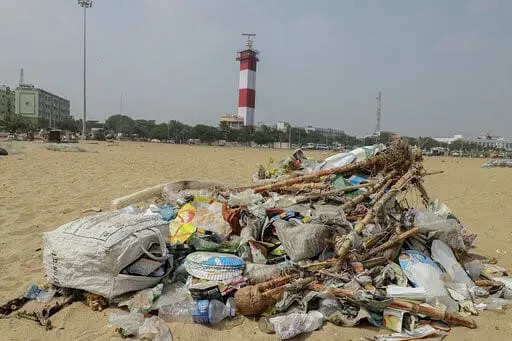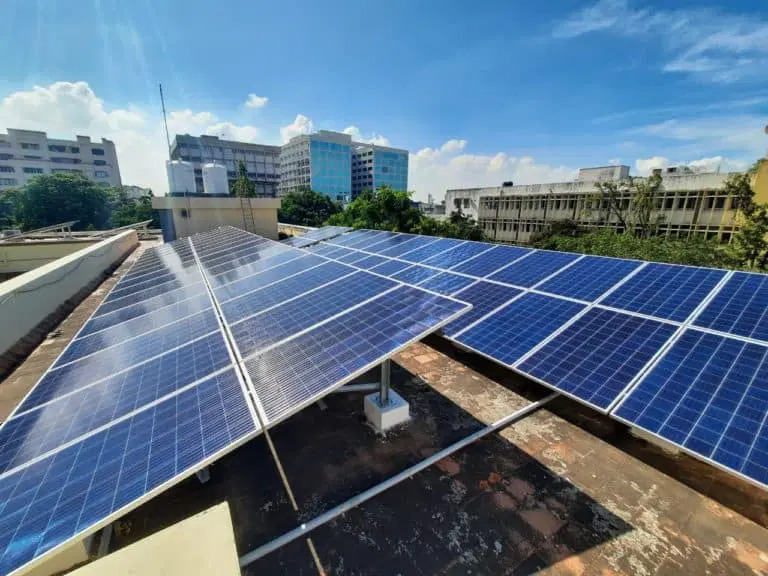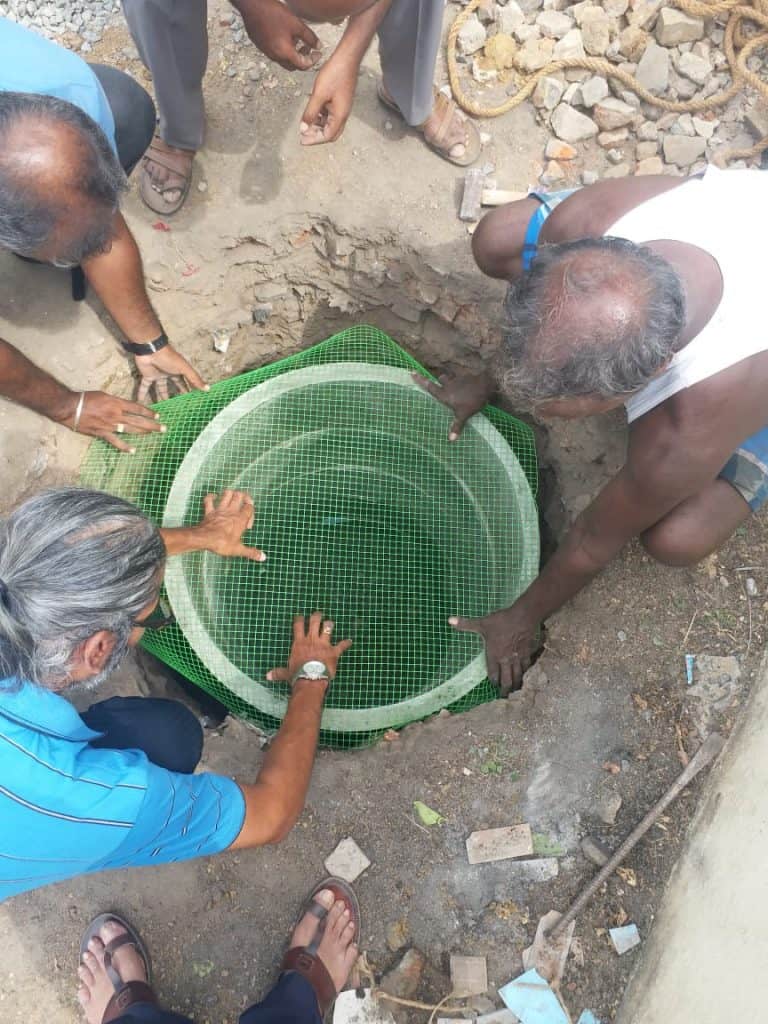The effects of climate change know no boundaries, transcending borders and impacting every individual, community and nation. India ranks third among the top 50 nations most vulnerable to the effects of climate change. Closer to home, this summer, Tamil Nadu witnessed sweltering heat waves, with the vulnerable facing the brunt of it.
Blue collar workers like Gauthaman, a water can supplier to households in Chennai, expressed concern about the escalating summer heat impacting his health, especially as much of his day is spent on the go. Nirmala, a domestic worker in the city, who also sells flowers in the evenings, echoed the same sentiment. She also pointed out that unpredictable weather patterns and irregular precipitation affect the blooming of flowers, again impacting her evening business.
These anecdotes are merely the tip of the iceberg, representing just a fraction of the broader challenges encountered by unprotected communities. There has never been a more urgent need to embrace sustainability.
Survey reveals sustainability practices embraced by Chennaiites
A recent survey conducted in Chennai by the Citizen consumer and civic Action Group (CAG) attempted to understand how sustainable the average urban dweller is. The group ‘office-goers’ was chosen as a representative sample and administered a self-assessment questionnaire over a span of 12 weeks.
The 50 respondents were asked questions regarding their sustainable practices in the use of resources like electricity and water. These questions remained consistent throughout the period ensuring that natural differences in behaviour across time were captured by the assessment. Questions regarding climate change awareness varied each week.
The results revealed encouraging sustainability practices among the respondents.
Over 90% of respondents reported adopting energy-saving practices, such as judiciously switching off household appliances and in the use of lights and fans.
Similarly, more than 90% were conscious of water usage, employing measures like using buckets and shorter showers to save water. Approximately 80% demonstrated waste reduction efforts such as cooking meals in small quantities to minimise food waste, using both sides of a sheet of paper for writing, carrying cloth bags while shopping, and utilising reusable containers to store foods.
On the downside, a significant percentage of respondents, around 72%, indicated that they do not use chemical-free toiletries and detergents, and 56% of them do not compost biodegradable waste. Moreover, a significant portion expressed a lack of awareness regarding climate change, highlighting the need for increased information dissemination.
Based on the survey findings, several recommendations were made in the report such as promoting the use of energy-efficient appliances, and water conservation measures and advocating for waste reduction and proper waste management.
Furthermore, the audit recommended promoting sustainable modes of transportation and improving access to low-carbon energy sources that can significantly contribute to reducing carbon footprint.
Sustainability not just the mandate of individuals
While this report highlights individual actions and choices, just well-meaning citizens taking personal action does not even begin to address the complex and systemic challenges climate change poses. Governments and corporations have a far greater responsibility to implement policies, regulations and sustainable practices. These are the measures that can have a greater impact on greenhouse gas emissions.
Building upon this notion, there is certainly some movement in the right direction with governments around the country already taking steps to address these challenges. State climate action plans such as those from the Tamil Nadu government are a case in point. The Tamil Nadu government is also spearheading sustainable development initiatives across various sectors, including renewable energy, water conservation, waste management and agriculture.
With their astute and inventive approach, the state has embraced sustainability with open arms, showcasing its commitment through innovative projects and community engagement. However, considering the gravity of the climate emergency and the urgency to act, there is still room for improvement.
Much of the recommended changes remain on paper, with the actual use of resources for government purposes themselves remaining markedly unsustainable. Use of single-use plastic, waste segregation, building design for energy efficiency and water conservation, for example, remains inconsistent across departments and governments.
Plastic ban as a measure of sustainability
Tamil Nadu in a landmark decision banned 14 types of single-use plastic items in June 2018 and reinforced the action under the ‘People’s Campaign Against Throw Away Plastics’ in September 2021.
A recent CAG study on the ‘Efficacy of the single-use plastic ban in Chennai‘ revealed that even with the ban in place, single-use plastics continue to be deeply ingrained in the daily lives of people. Plastic waste continues to be used for packaging, eventually finding its way into roads, waterways and of course, our mountainous landfills.

Plastic waste forms major part of the garbage dumped on Marina beach. Pic: Laasya Shekar
The lack of strict enforcement, together with poor availability and affordability of plastic alternatives remain the crux of the problem. To give this ban the momentum it deserves, a vigorous ecosystem of viable plastic alternatives needs to be maintained and encouraged among local businesses and vendors. This can then be followed by better enforcement through regular inspections, fines and penalties for violators.
Sustainable waste management a challenge in Chennai
Waste management is another pressing challenge. While analysing public attitudes to waste management typically reveals an overall lack of support for waste management strategies (such as not littering, waste segregation and composting), the system is also fraught with challenges from the sanitation teams themselves, including poor staffing, and low technical knowledge.
Chennai alone generates around 4,000 tonnes of waste every day, with only a small proportion of it undergoing any form of resource recovery. Just as mammoth as the problems might seem, there are also multiple avenues for creatively addressing these challenges – public education, infrastructure development, and enforcement of waste management regulations. Additionally, embracing decentralized solid waste management (DSWM) holds promising solutions for the city’s waste management woes.
With local communities overseeing waste processing, this can offer financial viability, sustainability and efficient waste control. Adopting DSWM can pave the way for a more effective and organized approach, tackling challenges head-on. The bottom line though is ‘turning off the tap’. Government policies and corporate responsibility must tie together to reduce the amount of plastics being created in the first place.
Sustainability and renewable energy goals
Renewable energy is another important step that governments can take towards sustainability. Tamil Nadu boasts an impressive renewable energy capacity, with approximately 8,326.86 MW installed, accounting for 25.44% of the national total. As per Tamil Nadu’s Combined Development and Building Rules 2019, multi-storeyed buildings are required to allocate one-third of their total terrace area for solar photovoltaic panels.

According to a Greenpeace India report released in April 2018, the total rooftop solar potential of Chennai is 1,380 MW. A big share of this, nearly 46%, can come from the residential sector. Representational image. Pic: Laasya Shekhar
However, violations of this are routine, with a CMDA inspection between 2019 and 2021 revealing that 157 out of the 770 buildings that had been issued completion certificates had failed to install solar panels. A report by Citizen Matters further revealed that real estate firms in Chennai often opt to rent solar panels temporarily to obtain completion certificates, rather than invest in permanent installations. Deceptive practices like this pose obvious challenges to achieving Tamil Nadu’s ambitious solar energy targets.
The Tamil Nadu Energy Conservation Building Code (TNECBC) also prescribes standards for energy-efficient building design – these include aspects like ‘building envelope’ (including walls and roofs). In the absence of these recommended building features, and as a coping mechanism for increased vulnerability to heatwaves due to climate change, the urban population is increasingly relying on cooling appliances, which strains the electricity grid.
Adoption of rainwater harvesting as a measure of sustainability
On the rainwater harvesting (RWH) front, an awareness drive conducted by Chennai Metropolitan Water Supply and Sewerage Board in 2021 also assessed RWH structures across Chennai and found more than 37,000 houses requiring improvement in their RWH structures, and a staggering 65,000 houses completely lacking any rainwater harvesting facilities.

A mesh top that closes off the RWH pit build by residents in Chennai. Pic: L Sundararaman
Additionally, the survey revealed that a significant number of people were not even aware that RWH structures needed to be de-silted before the onset of rains, contributing to the ineffective functioning of these systems. Additionally, there have been concerns that buildings continue to employ outdated rainwater harvesting procedures, resulting in inefficient water percolation and drainage during rainfall.
Experts emphasise the need for a change in mindset, where RWH installation is viewed not merely as a Government mandate but as a crucial water conservation measure. Recharge wells are suggested as a more sustainable alternative to percolation pits, which tend to clog over time due to soil accumulation. Moreover, by law, a building without a RWH structure should not be issued a No Objection Certificate (NoC).
Despite the mandatory RWH requirement for buildings, NoCs have been issued without verifying the presence of RWH structures. Strict enforcement of these sustainable prerequisites for issuing NoC for buildings will encourage builders and residents to follow the rules and force the civic bodies to be more transparent and accountable in checking compliance before issuing NoC.
Stakeholders in sustainability
Apart from Governments, corporations also play a crucial role in addressing climate change and implementing mitigation strategies. Adopting sustainable practices to reduce greenhouse gas emissions, conserve resources, and implement eco-friendly technologies while promoting solidarity economy principles are essential first steps that corporations must take. While it is unlikely that corporations will willingly do any of these (save for a small minority), these might be overseen under CSR regulations.
As it becomes irrefutable that the planet we will leave behind for future generations is going to be a damaged one, including sustainability and climate awareness education within the school and college curriculum to help them face the future that looms ahead remains an essential mandate that governments have to look into.
Ultimately, the role of the individual is to bring stakeholders together, act as enlightened citizens empower consumers and embrace sustainable lifestyles. Individuals further have the power to demand action from the government by creating awareness, participating in public campaigns, making sustainable choices, collaborating with NGOs, and supporting environmentally conscious leaders through voting.
These efforts can drive the government to prioritise sustainability in its policies. With citizens demonstrating good intentions, a desire for change and being intuitively sustainable as deciphered from the CAG audit, it is crucial for governments and corporations to collaborate in sculpting sustainable societies.
Failing to act now will lead to unsettling consequences of climate change, disrupting our very survival.
This article was originally published by The Citizen Matters on 31 August 2023.
Add new comment